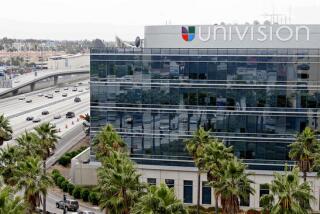New Twist in Mexican Bank Deal : Privatization: Owners of that nation’s top brewery and bottling concern plan to sell controlling interest in their firms to repay a U.S. loan used to buy the second-biggest bank.
- Share via
MEXICO CITY — The major shareholders of the world’s largest Coca-Cola bottler and Mexico’s top brewery plan to auction off their controlling interests to repay a $900-million U.S. bank loan they used to buy Mexico’s second-biggest bank, sources said Thursday.
“They apparently are having a lot of liquidity problems as a result of the Bancomer purchase,” a source on the Mexican Stock Exchange said. Shares of Bancomer and the company that owns the brewery and bottler are traded on the exchange.
The auction to cover the Morgan Guaranty Trust loan raises news concerns about high prices being paid for the 18 commercial banks the government is selling as a major part of its privatization effort. Half the banks have been sold to date.
The auction plans were expected to be presented to shareholders late Thursday in the northern industrial city of Monterrey. Company officials were said to be in conference all day preparing for the meeting. Officials were unavailable for comment Thursday.
Another source close to the bidding said U.S. and Dutch companies are among those expected to make offers on Monterrey-based Visa’s 60% stake in the Mexico City soft drink bottler, the brewery--which makes Tecate, Dos Equis, Superior, Bohemia and Carta Blanca beer--and related businesses. The market value of Visa’s shares in the businesses is about $1.5 billion, based on Thursday’s trading.
The sellers are led by Eugenio Garza Laguera, the grandson of the man who founded the brewery 100 years ago, starting an industrial dynasty that is also prominent in Mexico’s steel, petrochemical and food processing industries, as well as financial services.
Visa is setting up a complex trust fund arrangement and taking separate bids on its stake in each business, apparently in the hope of being able to repurchase the shares later.
Visa’s major shareholders also hold a stake in Vamsa, the financial services company that last month agreed to pay $2.6 billion--nearly three times earnings--for 51% controlling interest in Bancomer, Mexico’s second-largest bank.
Earlier this year, in preparing to bid on the banks that the government announced it would divest, Visa sold part off part of the brewery and bottler for $87.5 million to U.S. investors.
Vamsa shareholders sought the Morgan Guaranty bridge loan to beat out three competitors in the bidding for Bancomer, which controls 22% of the country’s total banking assets. At the press conference after the sale, Vamsa representatives indicated that without the loan, they would have been forced to sell assets to pay for the bank.
While the Bancomer sale was the most obvious example of investors taking on large amounts of debt to buy banks, the high prices have worried some economists.
Under the North American free trade agreement being negotiated with the United States and Canada, Mexican banks are expected to lose their current protected market. They will have to operate on lower margins to compete, and those lower margins may not generate sufficient profits to provide investors acceptable returns on their investments at such high prices.
Banks must also be prepared to invest to respond to competition, the economists argue.
However, stock market analysts argue that Bancomer is so profitable--generating earnings of $315 million in the first 10 months of this year--the investors will earn enough money to cover their costs, improve bank services and still be able to buy back the assets they are selling.
In addition, there is evidence that new owners could well afford the prices they paid for banks.
The liquidity problems among Bancomer’s new owners contrast sharply with the flush administration at Mexico’s largest bank, Banco Nacional de Mexico, which was purchased in August for $3.2 billion.
Besides making their payments to the government in advance, the new owners of Banamex--as the bank is known--this week paid $10 million for a Colombian bank, Banco de Comerico.
More to Read
Sign up for Essential California
The most important California stories and recommendations in your inbox every morning.
You may occasionally receive promotional content from the Los Angeles Times.













